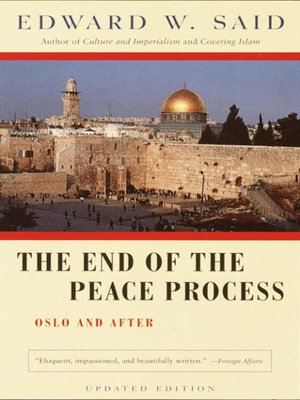
Sign up to save your library
With an OverDrive account, you can save your favorite libraries for at-a-glance information about availability. Find out more about OverDrive accounts.
Find this title in Libby, the library reading app by OverDrive.



Search for a digital library with this title
Title found at these libraries:
| Library Name | Distance |
|---|---|
| Loading... |
In this unflinching cry for civic justice and self-determination, Said promotes not a political agenda but a transcendent alternative: the peaceful coexistence of Arabs and Jews enjoying equal rights and shared citizenship.
"Eloquent, impassioned, and beautifully written."-Foreign Affairs
Soon after the Oslo accords were signed in September 1993 by Israel and Palestinian Liberation Organization, Edward Said predicted that they could not lead to real peace. In these essays, most written for Arab and European newspapers, Said uncovers the political mechanism that advertises reconciliation in the Middle East while keeping peace out of the picture.
Said argues that the imbalance in power that forces Palestinians and Arab states to accept the concessions of the United States and Israel prohibits real negotiations and promotes the second-class treatment of Palestinians. He documents what has really gone on in the occupied territories since the signing. He reports worsening conditions for the Palestinians, critiques Yasir Arafat's self-interested and oppressive leadership, denounces Israel's refusal to recognize Palestine's past, and—in essays new to this edition—addresses the resulting unrest.
"Eloquent, impassioned, and beautifully written."-Foreign Affairs
Soon after the Oslo accords were signed in September 1993 by Israel and Palestinian Liberation Organization, Edward Said predicted that they could not lead to real peace. In these essays, most written for Arab and European newspapers, Said uncovers the political mechanism that advertises reconciliation in the Middle East while keeping peace out of the picture.
Said argues that the imbalance in power that forces Palestinians and Arab states to accept the concessions of the United States and Israel prohibits real negotiations and promotes the second-class treatment of Palestinians. He documents what has really gone on in the occupied territories since the signing. He reports worsening conditions for the Palestinians, critiques Yasir Arafat's self-interested and oppressive leadership, denounces Israel's refusal to recognize Palestine's past, and—in essays new to this edition—addresses the resulting unrest.







